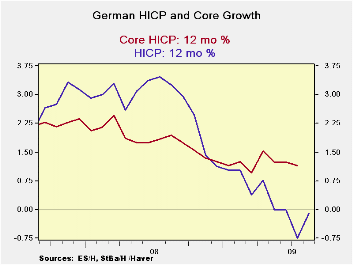 Global| Sep 09 2009
Global| Sep 09 2009German Prices Fall Yr/Yr Again-But It's NOT Deflation
Summary
German consumer prices fall Yr/Yr! - The headlines may read that German inflation on the HICP measure is down again Yr/Yr but don’t bite on that headline or on the nuance that it might be deflation time in Europe. Nothing is farther [...]

German consumer prices fall Yr/Yr! - The headlines may read
that German inflation on the HICP measure is down again Yr/Yr but don’t
bite on that headline or on the nuance that it might be deflation time
in Europe. Nothing is farther form the truth. First of all, Germany’s
headline inflation rose by 0.7% from July even as it fell from August
of one year ago. Next, the German domestic inflation gauge rose by 0.5%
in the month and is up by a narrow 0.1% Yr/Yr, failing to confirm any
downtrend. Moreover, German domestic core (ex food and energy)
inflation rose by 0.2% and is up by 1.1% Yr/Yr. Inflation in Germany is
tame the core pace is steady, and deflation is nowhere in sight.
The cards are stacked against deflation - For those who might
harbor deflation dreams let’s note that we are looking at data from
August. In September the German HICP index will rise by 0.1 index
points in 2008. So any rise less than 0.1 index points (less than 0.1%)
in Sept 2009, will take the headline German HICP lower again. But then
from September 2008 to August of 2009 every single month’s headline
price index (the index LEVEL) is below that of September 2008. If
German deflation is going to set in, that will have to happen on the
strength of current prices falling month-by-month in the future not
just rising more slowly than they did one year ago.
There is no real deflation trend - Headline HICP inflation is
up in eight of the last nine months in terms of its month-to-month
changes. There is no real evidence that deflation has taken any hold in
Germany. Indeed, the chart on German Yr/Yr headline and core HICP
inflation shows that the headline rate, while still negative, has
upward momentum building.
Growth is taking root - With German industrial orders up
strongly and orders in Europe expanding and revivals in consumer
sentiment being experienced, it seems that Europe and Germany are on
their way back to better times. While the economies on the continent
may continue to fall short of being in full employment, there is no
evidence to suggest that prices have much downside risk.
| German HICP | |||||||
|---|---|---|---|---|---|---|---|
| Mo/Mo % | Saar % | Yr/Yr | |||||
| Aug-09 | Jul-09 | Jun-09 | 3-Mo | 6-Mo | 12-Mo | Yr Ago | |
| HICP Total | 0.7% | -0.5% | 0.5% | 2.6% | 0.6% | -0.1% | 3.3% |
| Core | #N/A | 0.1% | 0.2% | #N/A | #N/A | #N/A | 1.9% |
| CPI | |||||||
| All | 0.5% | -0.4% | 0.4% | 1.9% | 0.6% | 0.1% | 3.1% |
| CPIxF&E | 0.2% | 0.3% | 0.0% | 1.9% | 1.3% | 1.1% | 1.8% |
| Food | -0.4% | -0.4% | 0.5% | -1.1% | -3.0% | -2.7% | 7.0% |
| Alcohol | 0.4% | -0.8% | 0.5% | 0.0% | -0.7% | -1.5% | 4.2% |
| Clothing & Shoes | 1.9% | -1.5% | -0.3% | 0.4% | -0.4% | 1.5% | 1.5% |
| Rent &Util | 0.3% | -0.4% | 0.2% | 0.4% | -0.7% | -0.2% | 3.9% |
| Health Care | 0.0% | 0.1% | -0.1% | 0.0% | 1.6% | 0.7% | 1.9% |
| Transport | 2.4% | -1.1% | 0.8% | 8.9% | 3.6% | -2.0% | 4.8% |
| Communication | 0.0% | 0.0% | 0.1% | 0.4% | -0.9% | -1.6% | -3.6% |
| Rec &Culture | 0.5% | 0.5% | -0.1% | 3.6% | 2.4% | 2.1% | 0.4% |
| Education | -0.5% | 0.8% | -0.2% | 0.6% | -8.2% | -5.1% | 3.4% |
| Restaurant & Hotel | -0.1% | 0.2% | -0.2% | -0.4% | 0.4% | 1.7% | 2.4% |
| Other | 0.4% | 0.3% | 0.1% | 3.0% | 2.6% | 1.8% | 1.8% |
| Diffusion | -- | -- | -- | 81.8% | 54.5% | 18.2% | -- |
| Type: | Diffusion: Current Compared to | 6-mo | 12-mo | Yr-Ago | -- | ||
Robert Brusca
AuthorMore in Author Profile »Robert A. Brusca is Chief Economist of Fact and Opinion Economics, a consulting firm he founded in Manhattan. He has been an economist on Wall Street for over 25 years. He has visited central banking and large institutional clients in over 30 countries in his career as an economist. Mr. Brusca was a Divisional Research Chief at the Federal Reserve Bank of NY (Chief of the International Financial markets Division), a Fed Watcher at Irving Trust and Chief Economist at Nikko Securities International. He is widely quoted and appears in various media. Mr. Brusca holds an MA and Ph.D. in economics from Michigan State University and a BA in Economics from the University of Michigan. His research pursues his strong interests in non aligned policy economics as well as international economics. FAO Economics’ research targets investors to assist them in making better investment decisions in stocks, bonds and in a variety of international assets. The company does not manage money and has no conflicts in giving economic advice.






